ILAN BEN ZION
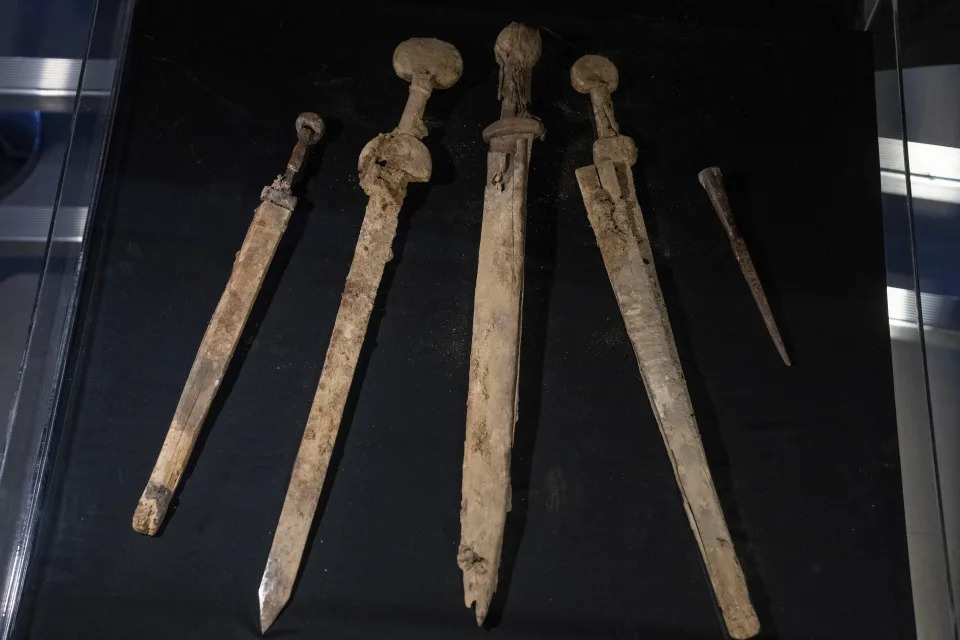
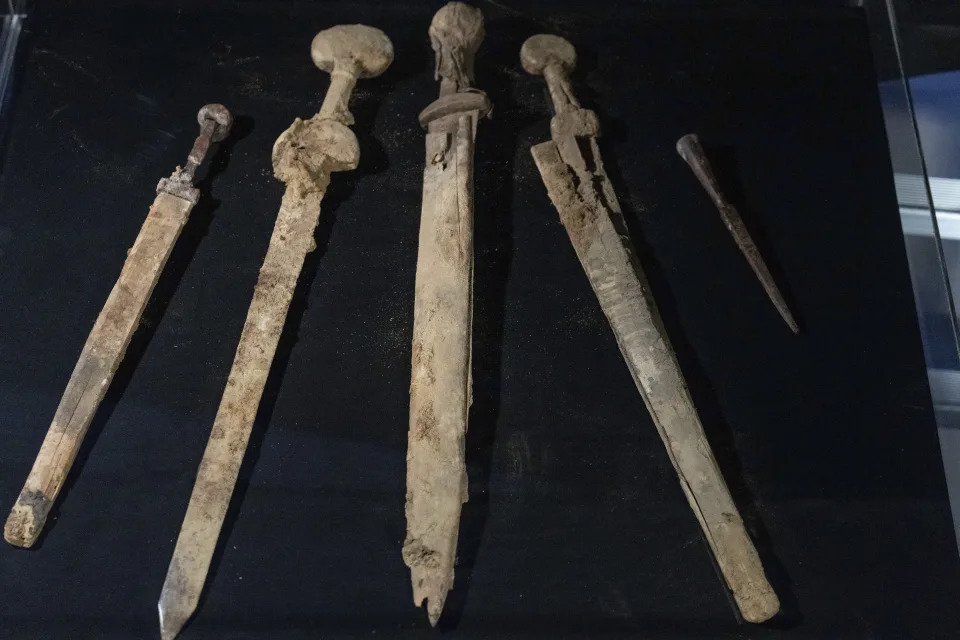
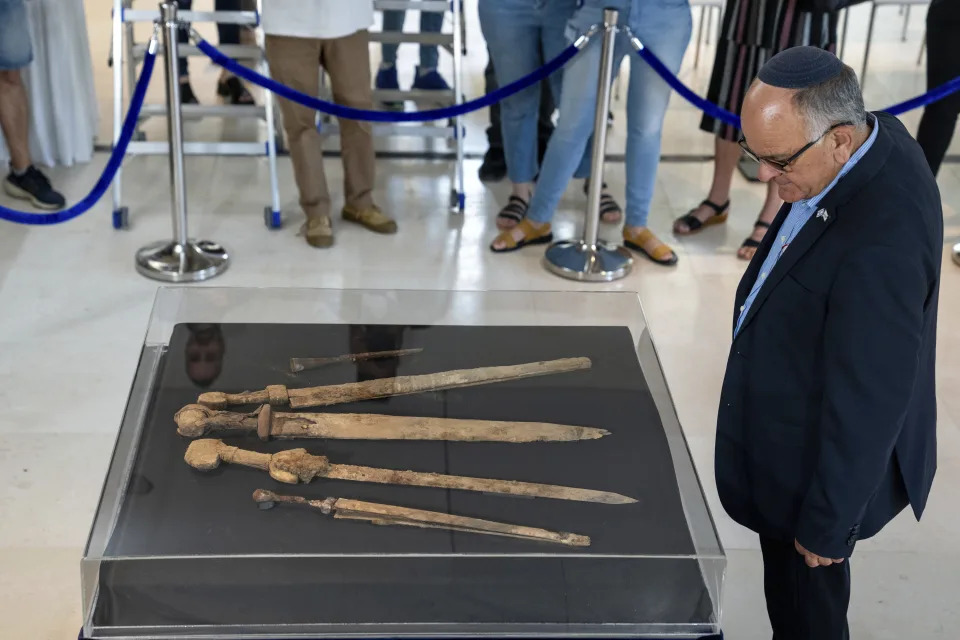
Israeli archaeologists show four Roman-era swords and a javelin head found during a recent excavation in a cave near the Dead Sea, in Jerusalem, Wednesday, Sep. 6, 2023. Archaeologists said the exceptionally preserved artifacts are dated to the 2nd century, when Jewish rebels launched an uprising against the Roman Empire.
JERUSALEM (AP) — Four Roman-era swords, their wooden and leather hilts and scabbards and steel blades exquisitely preserved after 1,900 years in a desert cave, surfaced in a recent excavation by Israeli archaeologists near the Dead Sea, the Israel Antiquities Authority announced Wednesday.
The cache of exceptionally intact artifacts was found about two months ago and tells a story of empire and rebellion, of long-distance conquest and local insurrection.
Researchers, who published the preliminary findings in a newly released book, propose that the arms — four swords and the head of a javelin, known as a pilum — were stashed in the remote cavern by Jewish rebels during an uprising against the Roman Empire in the 130s.
The swords were dated based on their typology, and have not yet undergone radiocarbon dating.
The find was part of the antiquities authority's Judean Desert Survey, which aims to document and excavate caves near the Dead Sea and secure scrolls and other precious artifacts before looters have a chance to plunder them.
The cool, arid and stable climate of the desert caves has allowed exceptional preservation of organic remains, including hundreds of ancient parchment fragments known as the Dead Sea Scrolls.
Those Jewish texts, discovered last century and dated to the first centuries BCE and CE, contain the earliest known versions of the Hebrew Bible, as well an assortment of esoteric writings.
Archaeologists returned to this particular cave near the desert oasis of Ein Gedi to document an inscription found decades earlier.
“At the back of the cave, in one of the deepest part of it, inside a niche, I was able to retrieve that artifact — the Roman pilum head, which came out almost in mint condition,” said Asaf Gayer, an archaeologist with Ariel University.
But though the swords were found on the eastern edge of the Roman Empire, they were likely crafted in a distant European province and brought to the province of Judaea by soldiers in the military, said Guy Stiebel, a Tel Aviv University archaeologist specializing in Roman military history.
He said the quality of their preservation was exceptionally rare for Roman weapons, with only a small handful of examples from elsewhere in the empire and beyond its borders.
“Each one of them can tell you an entire story,” he said. Future research will focus on studying its manufacture and the origin of the materials in order to tease out the history of the objects and the people it belonged to — Roman soldiers and Jewish rebels.
“They also reflect a much grander narrative of the entire Roman Empire and the fact that from a small cave in a very remote place on the edge of the empire, we can actually shed light about those mechanisms is the greatest joy that the scientist can have,” he said.
'It's a dream': 4 Roman swords likely stolen as war booty 1,900 years ago discovered in Israeli cave
Jennifer Nalewicki
Wed, September 6, 2023
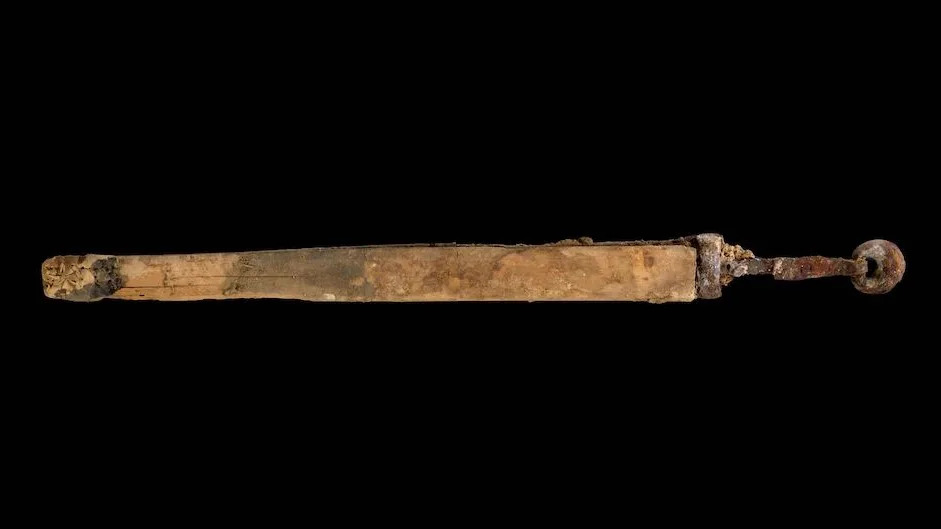
A 1,600-year-old Roman sword photographed inside a studio with a black background.
Archaeologists in Israel have discovered four well-preserved 1,900-year-old Roman swords lodged in a crevice inside a cave in the Judaean Desert — weapons that rebel Jewish forces likely seized in battle and later hid.
Of the four "rare" weapons, three with iron blades were still protected in their wooden and leather sheaths. The blades of three of the swords measured between 24 and 26 inches (60 and 65 centimeters) with dimensions similar to Roman "spatha" swords, while the fourth had a much shorter, 18-inch (45 cm) blade and was classified as a ring-pommel sword. All of the swords were "standard" issue and used by Roman soldiers stationed in Judaea at the time, according to a statement released by the Israel Antiquities Authority (IAA) on Wednesday (Sept. 6).
"Finding a single sword is rare — so four? It's a dream," the researchers wrote in the statement. "We rubbed our eyes to believe it."
Researchers think Judaean rebels may have hidden the cache inside the cave in what is now En Gedi Nature Reserve in northern Israel after seizing the items from the Roman army as "booty" during the Bar Kokhba Revolt, a rebellion that was led by Jews in the Roman province of Judaea and unfolded between A.D. 132 and 135.
"Obviously, the rebels did not want to be caught by the Roman authorities carrying these weapons," Eitan Klein, IAA deputy director and one of the directors of the Judean Desert Survey Project, said in the statement. "We are just beginning the research on the cave and the weapon cache discovered in it, aiming to try to find out who owned the swords, and where, when and by whom they were manufactured."
The swords were part of an exhibition on Wednesday promoting an article about the finding published in the new research book "New Studies in the Archaeology of the Judean Desert: Collected Papers."
A team of archaeologists in Israel remove a sword from a cave.
The discovery comes 50 years after a different team of researchers found a stalactite inside the cave. The formation bore an ink inscription scrawled in ancient Hebrew script that was similar to text written during the First Temple period (957 B.C. to 586 B.C.), which began with the construction of the temple of King Solomon and ended with its destruction at the hands of the Babylonians.
Researchers visited the cave to photograph the stalactite, hoping to find additional inscriptions. Instead, they stumbled upon the cache of swords.
"This is a dramatic and exciting discovery, touching on a specific moment in time," Eli Escusido, director-general of the IAA, said in the statement, adding that the finding is a "unique time capsule" in Judaean history.
4 Roman-era swords were found perfectly preserved in their scabbards in a cave. They were as sharp as if they were hidden today, scientists said.
Marianne Guenot,Chris Panella
Wed, September 6, 2023

Scientists discovered four perfectly preserved Roman swords hiding in a cave near the Dead Sea, the Israel Antiquities Authority said Wednesday.
Perfectly preserved Roman-era swords were discovered in a Dead Sea cave by Israeli reseachers.
The Israeli Antiquities Authority thinks the four swords were used by Judean rebels 1,900 years ago.
One reseacher said they "look as if they could be picked up and used right now."
Israeli researchers made a rare find during a survey of a Dead Sea cave: Four perfectly preserved Roman swords thought to have been used in battle 1,900 years ago.
The swords were likely "booty" hidden by rebels from an opposing faction, who would have been in danger if they were caught carrying the Roman weapons, Eitan Klein, one of the directors of the Judean Desert Survey Project who worked on the dig, said in a statement.

Four Roman-era swords, their wooden and leather hilts and scabbards and steel blades exquisitely preserved after 1,900 years in a desert cave, surfaced in a recent excavation by Israeli archaeologists near the Dead Sea, the Israel Antiquities Authority announced Wednesday.
On Wednesday, the Israeli Antiquities Authority announced the discovery of the cache in a small, almost inaccessible Judean Desert cave near the Dead Sea. In a video detailing their expedition, researchers said they removed the swords from a tight crevice in the cave.
"We are talking about an extremely rare find, said Dr. Eithan Klein, a Judean Desert Survey researcher with the Israel Antiquities Authority, "The like of which has never been found in Israel."
Scientists said the swords featured wooden and leather hilts, wooden scabbards, and steel blades that were amazingly preserved after spending almost 2,000 years in a remote desert cave.
Eli Escusido, director of the Israel Antiquities Authority, said the swords were as sharp "as if they had only just been hidden away today," the BBC reported.
The archaeologists also found a Roman pilum, a heavy javelin.
The swords, the archaeologists said, were weapons typically used by Roman soldiers stationed in Judea.

Researchers discover the ancient Roman-era swords in a small crack of a remote cave near the Dead Sea.Emil Aladjem, Israel Antiquities Authority
"The hiding of the swords and the pilum in deep cracks in the isolated cave north of 'En Gedi, hints that the weapons were taken as booty from Roman soldiers or from the battlefield, and purposely hidden by the Judean rebels for reuse," Klein said.
Klein said it is possible the weapons may have been stashed at the time of the Bar Kokhba Revolt of 132–135 BCE, but added that he and researchers are conducting further work to pinpoint who owned the weapons, where they were forged, and what historical events they could have been used in.

Researchers also found artifacts over 6,000 years old in the cave.Yoli Schwartz, Israel Antiquities Authority
Business Insider
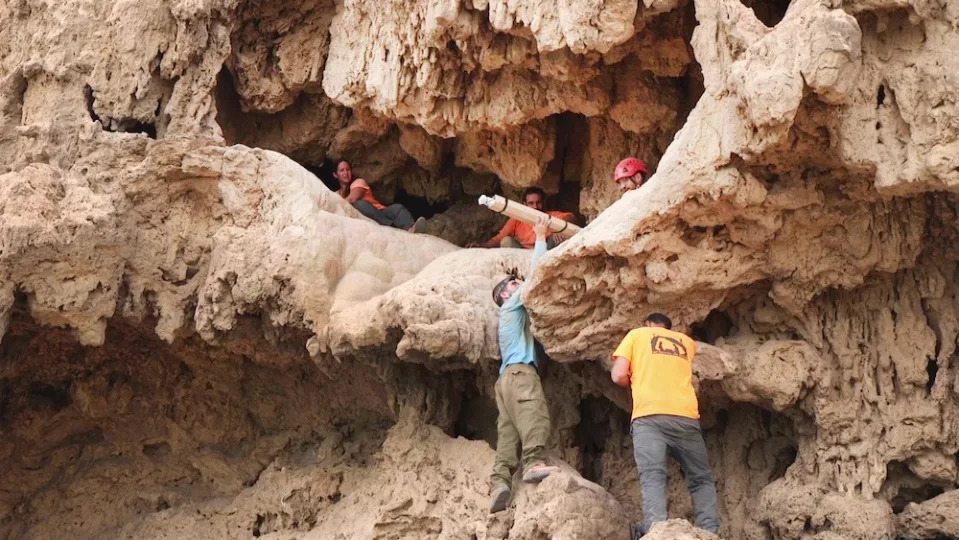
No comments:
Post a Comment